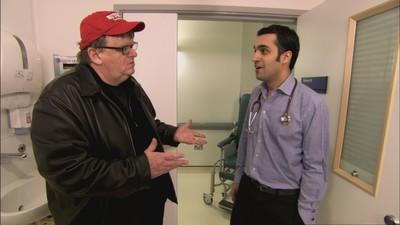‘Sicko’
You're too big to cry but it hurts too much to laugh.
That's how Adlai Stevenson II described losing the presidency.
All these years later, however, that rueful assessment neatly applies to America's "Sicko" health care system -- and the mixed emotions prompted by filmmaker/provocateur Michael Moore's latest cinematic outcry.
There are those, of course, for whom the mere mention of Moore's name triggers an automatic outburst. (I know -- I got lots of anonymous, expletive-undeleted voice mail messages in 2004 when I dared to give Moore's "Fahrenheit 9/11" an enthusiastic endorsement.)
But for those willing to open their minds and consider the message without vilifying the messenger, "Sicko" makes a cogent, coherent argument that the state of American health care -- and the millions of Americans who can't afford it -- is sicko indeed.
We often hear that the United States has the best medical facilities and most advanced treatment in the world. (Somehow, I suspect the wounded Iraq veterans being treated at Walter Reed Army Medical Center might disagree, but that's another story.)
What good are advanced medical treatments and medications, however, if Americans can't afford them?
"Sicko" introduces us to a variety of the health care system's victims -- and perpetrators. Two of the latter turn out to be our old Watergate pals Richard Nixon and John Erlichman, who share a telling Oval Office conversation (without an 18-minute gap on the audio tape) about an innovative for-profit managed care program that links greater profits with less care.
And, in some cases, no care. "Sicko" overflows with horror tales of the uninsured, the underinsured and those who have insurance but still can't get treatment -- losing their houses, their dignity and sometimes their lives in the process.
Anyone who can remain unmoved while watching a grieving mother recall the toddler who died before the ambulance arrived at the hospital that took her mother's insurance -- or a couple beset by heart attacks (his) and cancer (hers) forced to move into their daughter's spare room because they had to sell their home to pay their medical bills -- or a wife watching her husband die from a malignant tumor officials insisted wasn't life-threatening -- needs a heart transplant. The kind you don't have to pay for.
Happily, "Sicko" shares a few success stories, too, such as the father who wangled a second cochlear implant to counteract his daughter's hearing loss -- from an insurance company that only wanted to pay for one -- by alerting them to the fact that he planned to share his story with Moore.
"Sicko" also hits the road to see how other folks live -- in Canada, in Britain, in France and even in (gasp!) Cuba, where Moore leads a group of Sept. 11 volunteers, wracked by chronic health problems, to Guantanamo Bay Naval Base in hopes of getting the same high-level health care received by enemy combatants incarcerated there.
Sure, it's a stunt, an absurdly caustic one, but when Moore and his fellow travelers hit the Cuban streets, they find freely accessible medical care open to all. Even to American interlopers, some of whom burst into tears at the contrast between the treatment they receive at home and in supposed enemy territory. (One paramedic discovers that the inhaler she pays more than $100 for in the United States costs about a nickel in Cuba.)
What's wrong with this picture? Cinematically speaking, not much.
Unlike the incendiary "Fahrenheit 9/11," which blazed with indignant political fire, "Sicko" has a much less divisive topic. After all, who among us hasn't been outraged by labyrinthine medical and insurance procedures? (Assuming we have insurance, that is -- not guaranteed in what everyone agrees is the richest nation in the world.)
Britain's system, where people pay what they can and receive the treatment they need, emerged from a nation left in ruins by World War II. At the time, government officials reasoned, "If you can find money to kill people, you can find money to help people," as one veteran politician recalls.
Following a pattern he began in "Fahrenheit 9/11," Moore injects much less of himself into "Sicko" than in past movies, allowing individuals victimized by the system (if you can call it that) to speak for themselves. Throughout, however, his impish irreverence surfaces to inject welcome humor into the awful truth.
As a result, "Sicko" allows those of us in the audience to make up our minds, rather than having Moore do it for us. Watching "Sicko," you may laugh until your sides ache. Thinking about it during and after, however, what you see in "Sicko" just might make you sick.
CAROL CLINGMORE COLUMNS
MOVIE REVIEW movie: "Sicko" running time: 116 minutes rating: PG-13; brief profanity verdict: B+ now playing: Colonnade, Green Valley, Orleans, Suncoast






















